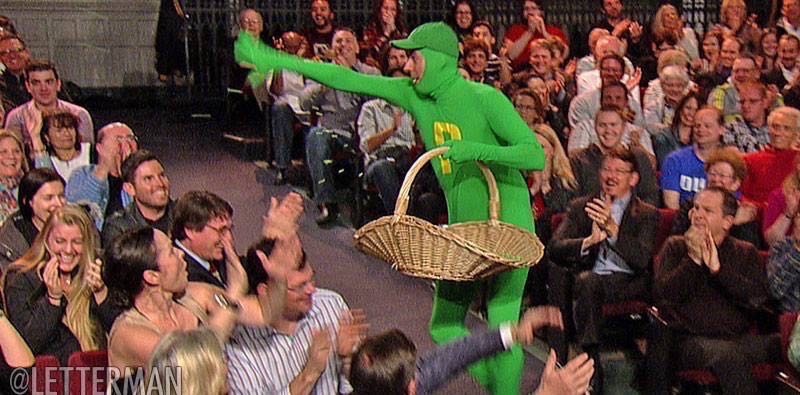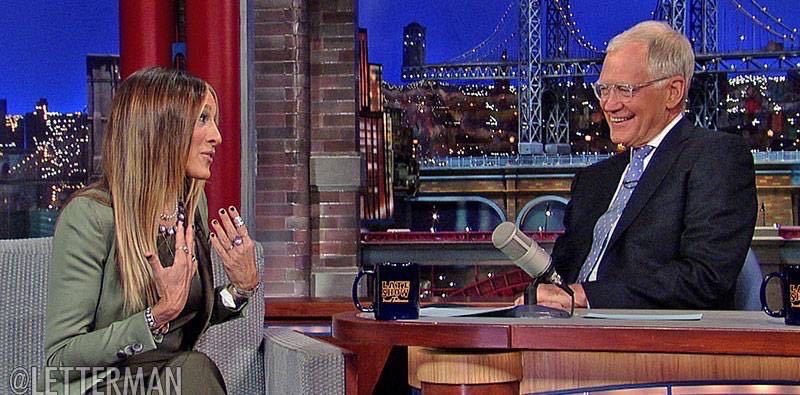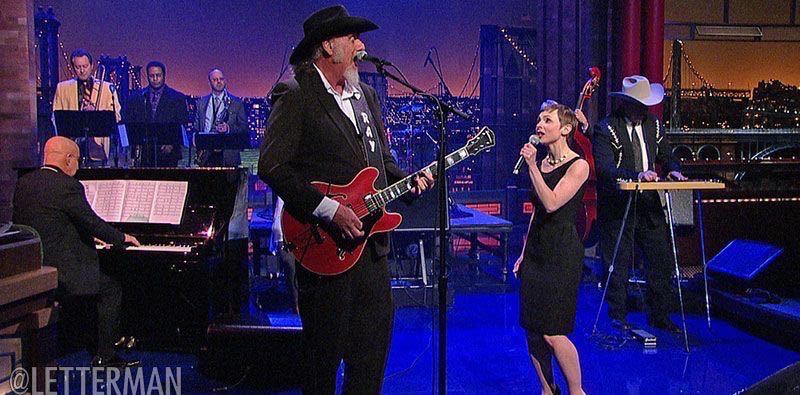
“From the moon’s Copernicus crater...”
It is Episode 6,001
April 13, 2015
After the Late Show’s opening credits, the first shot is always the empty stage, quickly followed by David Letterman running as fast as lightning across the stage from left to right. Then he walks out to cheers from the right side, as if he had been on that side the entire time. Dave sprinting across the stage was one thing viewers could count on to start the show. It was impressive the way director Jerry Foley timed the shot every night just as Dave ran.
Eddie Valk (Stage Manager): Biff Henderson [stage manager] would be on the headset with the control room, and he would let Jerry Foley know when Dave was about to run across.
The opening credits end and the lens blurs to the stage, Alan Kalter says, “And now, born to rock the boat . . . David Letterman.” The camera pans to the stage, but Dave doesn’t run across. The screen stays empty for a beat and then pans left as Dave enters through the cityscape behind the desk. He navigates around the comfy chairs and makes his way to center stage. The camera cuts to an audience member in the last row who waves to Dave with glee. Dave has altered the normal routine of the show to make an audience member happy. What else should we expect from the final series of shows other than the unexpected?
Randi Grossack (Associate Director): It is always a little frantic. You are trying to be on the same wavelength as Dave, thinking, “How he is thinking?” Whether he is sending a camera outside or if suddenly someone from the audience wants to drop something off the roof, you always have to be in that ready position for anything that might happen, because it was never scripted.
Jerry Foley (Director): You were required to be on Dave’s wavelength and be inside his head. There was no other way to do it. Randi is correct. There were plenty of days when I wasn’t able to decode what he was thinking, and that would make for a difficult time. All of us were required to be in the conversation with Dave, to be aware of the things he liked and didn’t like and where his mind would go for a certain joke or callback. It is an interesting point that there is Randi, an AD, and she had the burden of being in sync with Dave. That burden fell on everyone—the graphics department, audio, stage manager, writers, Paul, the musicians, everybody was required to be thinking the way he was thinking. That sometimes would be an impossible task, because his mind is so fast and it goes in so many directions that you never really truly arrive at the same place. You only hope to come close.
Dave receives extended applause and does his best to hurry it along. Still, it is early April, the crowd and media are not yet focused on the end. Once the audience settles, Dave begins his monologue. The topics include income taxes, the Masters Tournament, Dave’s birthday (which was the prior day), and Hillary Clinton’s presidential aspirations.
The Clinton campaign had just released a video of “regular” people revealing what they will be doing in 2015, and then Hillary says, “I am running for president.” The clip plays, but writer Joe Grossman is inserted into the mix of “regular people.” Joe, who always plays the sad sack, says, “I’m gonna be out of a job in a month thanks to this jackass.” He holds up a picture of David Letterman.
Joe Grossman: Someone pitched that videotaped piece that morning. I never pitched myself for the show. Those were usually written the morning of and then assembled during the day. We had done a few of those of me in my office with some boring thing for me to talk about. It was another variation of that. A few of those had me putting my head on my desk in despair. That’s my catchphrase: “guy in despair.” It was just an opportunity to put the awkward guy on camera, and Dave always enjoyed that.
The Act 2 desk piece begins but is interrupted when Paul and the band start playing uptempo music, which Dave calls to a halt to say, “As that unmistakable music tells me, once again it is time for Pea Boy.” Cut to the back of the studio; the doors open and a man in a green suit with a yellow “P” on his chest runs through the studio throwing peas at everyone. Pea Boy runs on stage and then out the back of the theater. This skit appears to have been planned, but in fact was another unexpected moment. The staff hadn’t planned the Pea Boy appearance. It all came up during the preshow question and answer between Dave and an audience member.

Jerry Foley: We ran into a stretch in this period of time where people who were visiting the show for the final time were inclined to go down memory lane. They would throw these memories out to Dave, who would then kind of turn them around to be challenges to the staff.
Joe Grossman: It was an audience person who asked about Pea Boy. So at the last minute they thought, “Wouldn’t it be great if we could get Pea Boy on the show tonight?”
Jerry Foley: One of the great private amusements Dave would have is when he would hijack the entire system, the technology, the people, the format, and say, “Oh, let’s see if you can jerk this thing around to an appearance by Pea Boy, who we haven’t seen in several years.” This amused Dave. He wanted to see whether or not we could pull it off. It was part of his managerial genius that somehow we all were motivated by the challenge. We wanted to kind of shut him down before he could complain that we couldn’t do it.
Bill Scheft (Writer): A woman asked, “Whatever happened to Pea Boy?” and Dave said to me, “What is the song that Paul and the band used to play for Pea Boy?” I said, “It’s the ‘Sabre Dance.’ Do you remember what to say?” He did remember. Used no cards, he nailed it.
Jerry Foley: You had props people who had to come up with baskets and peas. You had wardrobe people who had to get the costume. The band had to quickly come around and remember the song they played. All of us had to dig into our collective memories and say, “How did Pea Boy work?”
Bill Scheft: The staff put that all together during the commercial break. They had maybe twenty minutes. Pea Boy was from 1992. Donick Cary [writer] came up with that piece at the old show. We did it at the old and new show. Mike Leach was Pea Boy in 2015.
Joe Grossman: Mike was one of everyone’s favorite people at the show. He was a guy who was just up for anything. He was always good at his on-camera appearances. He was not the original Pea Boy, I don’t know who the original was.
Barbara Gaines: The original Pea Boy was David Ellner.
Jerry Foley: That mentality, that willingness to throw yourself at a particular assignment that was motivated by someone’s comment in the audience warm-up, that mindset was shared by everybody.
The Top Ten List features C-3PO and R2-D2 on stage counting down lines that have never been said in a Star Wars film. Paul plays “Cantina Band” from Star Wars Episode IV.
Sarah Jessica Parker is the first guest. She pretends to wipe away a tear and comically wipes her nose on her sleeve. Dave hands her a box of tissues. “Thank you,” she says. “I was planning on not crying.” She tucks the tissue up her sleeve. Before Dave can even finish his first sentence she stops him and says, “No, no, no, I just want to take a long hard look at you. I want to do for all Americans what they will not be able to do because I am here in their place. For all the men and women who cannot be here . . . [I will] look at you and perhaps tell you about yourself and what you have meant to us. I want you to take it like a man. I want you to sit here, because I know your instinct is that you don’t want to hear it.”

Right there in the first minute of the first guest in the final six weeks, Sarah Jessica Parker sets the tone for what these episodes will become. The reins of the show are flipped. This would not be Dave saying goodbye to his favorite guests. This would be the guests and, by proxy, America saying goodbye to their favorite host. Sarah isn’t there to promote a new movie or series, or any product. She’s there to tell Dave what he’s meant to her. Dave tries to joke his way out, but Parker isn’t having it.
Dave responds, “I want to hear about you.” Parker immediately shoots back, “I have no interest in me. I figure I have nothing to lose, because you can’t not ask me back again. I don’t want to make you uncomfortable, but I feel like this is my last hope.”
Jerry Foley: Typically the guests like Sarah Jessica Parker would interact with segment producers. They would do the pre-interviews and talk through the topics that might be good for the conversation. I would deal with the guests if we used them for any kind of pretape.
Brian Teta (Segment Producer/Supervising Producer): Sarah and I had our first conversation that morning. Doing a live show that turns around this quickly, you focused on the show at hand. You figured out what you were doing, you banged it out and started on the next one. I think her pre-interview happened at 11:00 that morning.
Barbara Gaines (Executive Producer): Sarah Jessica Parker came on just as a friend. She just came on to talk to Dave.
Brian Teta: I don’t know if Sarah was booked as the first guest in the final six weeks by design so much as it just worked out. She had a history with the show. Those spots were pretty coveted. No one was saying no to coming on at this point. We didn’t want to have people there that didn’t have a relationship or history.
Sheila Rogers (Supervising Producer/Talent Booker): Sarah and Dave always had a great rapport, and she did a guest-host spot when Dave was out with his heart surgery. She was one of the first in line to do that. She hadn’t been on a lot recently, so it was great to have her back. She was someone we said we had to have in the final weeks.
Brian Teta: I think Sarah had sincere feelings for Dave. She had been a guest since the old days at NBC. It began to be real at that point.
Parker continues her praise for Dave: “You’ve made us all so happy and been thoughtful, funny, and challenging and terrifying, and despite your best efforts, probably the most distinguished man on late-night television.”
Dave puts his hands over his ears, as if to deflect those words from entering his consciousness, and screams, “Oh, my God.” The audience erupts with applause. Paul plays a little fanfare music. Parker brings it all home by saying, “It really is the end of an era.”
This is not what Dave had in mind. He will spend a ton of time over the final weeks avoiding these moments, but the best appearances will be those that lean into this sentiment. Parker had always set a high bar for what a good talk show appearance could be. Over the years, she took part in skits and came prepared with great stories. She instinctively knew that this time it would be a heartfelt declaration of her affection for the host that would make her appearance memorable.
Sarah then recounts a dream she had about Dave years ago, flirting with him in a respectful, cute way. Their conversation covers parenting, her husband (Matthew Broderick), and how to talk to their children about the birds and the bees. Dave shares a charming story about his son, Harry, and sex education at school. A strong appearance and the perfect beginning to, as Sarah put it, the end of an era.
As the show fades to commercial, a picture of Sarah Jessica Parker from her appearance twenty-four years earlier on Late Night, on February 8, 1991, is shown. The picture is framed to look like a baseball card. These logos were created to highlight how many years the long-term guests have been appearing with Dave.
Jay Johnson (Digital Content): As part of the countdown to the end of the show, Walter Kim and I began posting images on our social platforms in the style of Late Show baseball cards that featured behind-the-scenes photos and staff profiles. Not long after we started doing that, Jerry Foley began using that same baseball card template to showcase select moments from old shows when going into commercial breaks.
Randi Grossack: The baseball cards became a big thing as the shows ticked away. We thought the guests loved them. We were always looking for the perfect shot. It wasn’t always easy finding the old shows, but it became a fun thing.
The second guest is the 2015 Masters Tournament winner, Jordan Spieth. Dave typically had the winner of the prestigious golf tournament on, since it aired on CBS.
Musical Guest

The musical guest, Asleep at the Wheel, with guest vocalist Kat Edmonson, performs “I Can’t Give You Anything but Love,” a western swing number. Paul and the band play along. Paul even performs the piano solo. Will Lee plays upright bass, and the horn section sits in.
Sheryl Zelikson (Music Booker): I think that Dave does have a great fondness for Americana music, as much as he has a great fondness for music like Foo Fighters and Pearl Jam. Asleep at the Wheel did have a longevity of being on that stage. When Letterman was at NBC, he would book David Byrne and alternative rock ‘n’ roll, all the things you wouldn’t get to see on Johnny Carson. Well, that became true with Americana in the later years of the show. You didn’t see a lot of it on other shows, so we had a space for that. I think he came to these artists without hearing them on the radio. He was listening to a lot of that type of music.
Worldwide Pants Tag: “May pants be with you.”